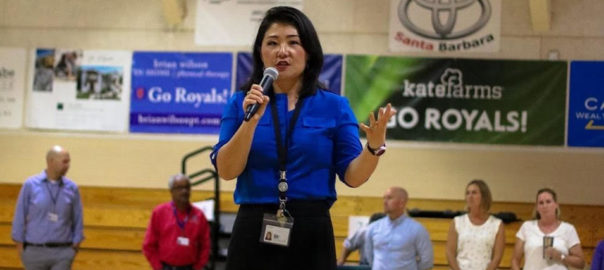by Kip Glazer
 This is the first of four posts from a practitioner’s perspective that were inspired by the theme of the CIRCLS’21 convening of remaking “broadening.” Educator CIRCLS aims to bridge research with classroom practice and broaden the community of people involved in CIRCLS. Learn more about the upcoming convening and register (starting August 13, 2021).
This is the first of four posts from a practitioner’s perspective that were inspired by the theme of the CIRCLS’21 convening of remaking “broadening.” Educator CIRCLS aims to bridge research with classroom practice and broaden the community of people involved in CIRCLS. Learn more about the upcoming convening and register (starting August 13, 2021).
When I was a classroom teacher, I attended a number of professional development (PD) workshops and conferences on teaching and learning. If you are a practitioner (a.k.a. a classroom teacher) in the field of education, you know that there are some PD sessions that try to share research findings and implications for the classroom that are simply awful. I am sad to say that I have attended my fair share of those over the past two decades.
One PD session in particular started me questioning. I was a teacher working with students who were learning to speak English. I attended a session on second language learning and the presenter had a Ph.D. in language development from a prestigious university and was supposed to be an expert in supporting language learners. I am a second language learner myself, having moved from South Korea to the United States at the age of 23. I was so excited to attend the workshop. I was thrilled to be given the responsibility of helping my students who needed help in gaining language skills. I attentively listened to her presentation, trying to gain any information that I could use to help my students.
While listening to her presentation, however, I realized that her research primarily focused on Spanish-speaking students. So I raised my hand and asked, “What if a student doesn’t speak Spanish? What strategies would you suggest we use? Do we need to modify anything? For example, what if they spoke Tagalog or Ilocano? How about Hmong? What about Mandarin?”
Soon I found myself debating with an “expert” in the field whose research seemed less than useful for the teachers who were sitting in the PD session. You see, I was teaching a group of students who spoke Hmong, Mandarin, and Russian. A few of them also spoke Spanish, but my Instructional Assistant spoke Spanish so they were getting support from another adult in the room. What I really needed were the strategies that I could use for all my students, not just the Spanish-speaking students, which was implied in the title of the workshop that said, “Proven Strategies that Support English Language Learners.” When I told the presenter that the strategies that she shared may not work for my students, she replied, “Teachers who have not had much exposure to good research may never learn to appreciate the true value of good research. Perhaps you should consider reading about things and learning more.”
I must say that I was young and a bit hot-headed at the time. I did question her expertise openly and vociferously in a group setting. Come to think of it, I might have sounded rather rude and even confrontational towards the presenter. So I believe that I probably deserved that chastisement from that particular presenter. But over the years, similar treatment of being dismissed as a professional in my field propelled me to eventually getting my doctorate in Learning Technologies so that no one could easily dismiss the expertise that I know I possess as an educator.
If you are an educator, how many times have you attended a workshop that didn’t address your specific needs or concerns? For that workshop I described earlier, I found out later that many of my colleagues had similar questions too, but they did not ask the questions like I did. They told me that they learned to just listen and nod since many researchers never seem to understand the challenges of teaching real students in real life. Some said that they didn’t want to get shut down like I was. Few advised me never to ask questions like that, especially in front of an administrator for fear of being labeled as a “rebellious” teacher. They shared that they felt some researchers do not make the best presenters because they don’t seem to value practitioners’ lived experiences. Many of these teachers were highly-skilled, highly-educated professionals who accepted their fate of being treated as interlopers in the very profession that they devoted their lives to.
One difference between educators and researchers may be because of how we have been socialized, or it could be our personalities. I’ll give an example. As a principal who often evaluates and supports teachers, I am often flabbergasted and saddened by the attitude of my fellow educators who look at their professional expertise from a “less-than” perspective. In the State of California, one needs a Master’s Degree to become a teacher. Yet many teachers are often reluctant to declare themselves to be the experts as classroom teachers. Contrast this to higher educational institutions who will hire a Ph.D. who has never even been a classroom teacher to train other teachers and call them an expert.
I know a 28-year old Ph.D. with research focused on gaming. She was hired as a professor in a teacher training program where she is in charge of training junior high and high school teachers. She has expertise in gaming that is valuable in the field of education, but I wonder about the depth of pedagogical or curricular strategies she could share with the teacher candidates. She has read about the issues, but can not know them from an authentic lived perspective since she hasn’t been in the classroom. What if she has to train future school administrators? What then? Can she anticipate and support how a state testing requirement, a board policy, public perception, student attitudes, or even limited wifi-access might derail a teacher’s good intention to fully use any game in the classroom to improve literacy and numeracy? Are we really setting her and her students (aka future teachers) up for success in doing the important job of educating our students?
As we come together to think about remaking broadening, I would like us to consider our differences and to value those differences as important. As an educator and now a school leader, I have seen so much promising research that could be useful for our students that does not yield any positive benefits for real students in real classrooms because researchers don’t connect the importance of the work in a way that makes sense to practitioners.
What an expert dreams up, no matter how good, will not make any impact unless the practitioners embrace it and use it for their students. In my opinion, the journey to making a true and relevant impact in the lives of our students begins with more connections between researchers and practitioners. In the next post, I’ll share more about how practitioners think about their students and discuss why practitioners’ voices matter in research on emerging technologies for teaching and learning.
Educator CIRCLS posts are licensed under a Creative Commons Attribution 4.0 International License. If you use content from this site, please cite the post and consider adding: “Used under a Creative Commons Attribution 4.0 International License (http://creativecommons.org/licenses/by/4.0/).”
Suggested citation format: [Authors] ([Year]). [Title]. Educator CIRCLS Blog. Retrieved from [URL]


